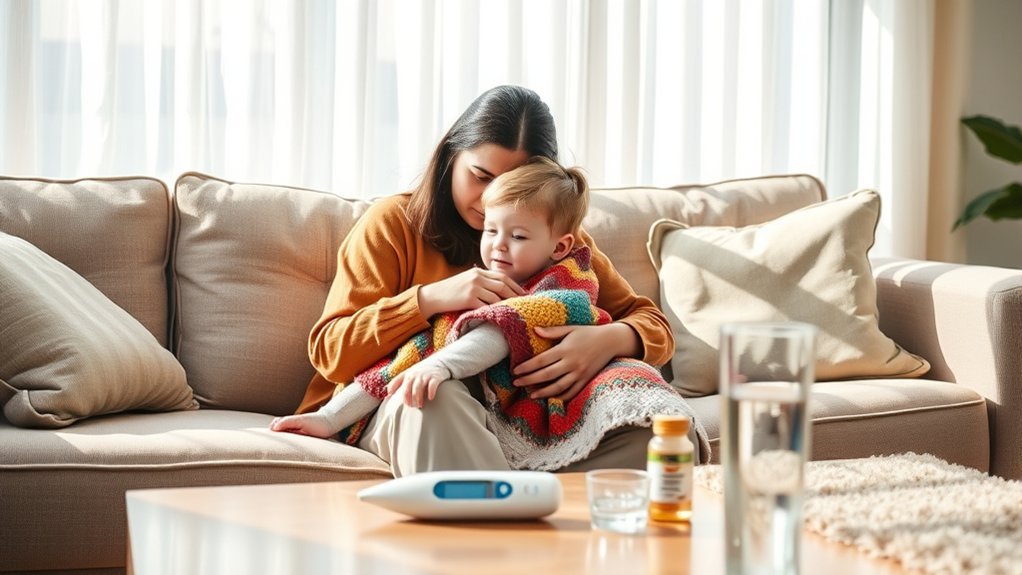Did you know that up to 40% of people experience a fever after vaccination? This reaction is a sign that your body is building immunity. Knowing how to manage this fever is essential, as it can make recovery smoother. However, there are common pitfalls to avoid. Understanding the do’s and don’ts can help you navigate this experience effectively. What should you prioritize for your comfort and health?
Understanding Fever as a Vaccine Reaction
When you receive a vaccine, it’s common to experience a fever as your body reacts and builds immunity. This fever is a natural response, indicating that your immune system is working to develop protection against the disease. The rise in body temperature helps create an environment that’s less favorable for pathogens.
While it can be uncomfortable, this reaction typically lasts for a short duration.
Fever after vaccination usually peaks within a day or two and resolves on its own without the need for medical intervention. It’s essential to understand that this reaction is generally a sign that the vaccine is doing its job, helping your body recognize and fight off future infections.
Always consult a healthcare professional if you have concerns.
Do’s: Managing Fever Effectively
Although a fever after vaccination is usually mild and temporary, managing it effectively can help you feel more comfortable. Here are some do’s to take into account:
A mild fever post-vaccination is common; managing it well can enhance your comfort during recovery.
- Stay Hydrated: Drink plenty of fluids like water or electrolyte drinks to help regulate your body temperature and prevent dehydration.
- Rest: Allow your body to recover by getting enough sleep. Resting helps your immune system function at its best during this time.
- Use a Cool Compress: Applying a cool, damp cloth to your forehead or neck can provide relief and help bring your temperature down.
Don’ts: Common Mistakes to Avoid
While managing fever after vaccination is important, there are common mistakes you should avoid to assure your comfort and safety.
| Mistake | Description | Consequence |
|---|---|---|
| Ignoring hydration | Not drinking enough fluids can worsen symptoms. | Increased discomfort |
| Self-medicating improperly | Taking the wrong dosage or medication can be risky. | Potential side effects |
| Overdressing | Wearing too many layers can trap heat. | Higher body temperature |
Stay aware of these pitfalls. Don’t hesitate to monitor your symptoms closely. Instead of assuming all fevers require medication, consider other comfort measures like rest or hydration. Avoiding these mistakes will help assure a smoother recovery after your vaccination.
When to Seek Medical Attention
Knowing when to seek medical attention after vaccination is essential for your health. While mild fever is common, certain signs indicate you should get help.
- High Fever: If your temperature exceeds 103°F (39.4°C) and doesn’t decrease with home care, it’s time to call a healthcare provider.
- Prolonged Symptoms: If fever lasts more than three days, or you experience worsening symptoms, don’t hesitate to seek advice.
- Severe Reactions: Look out for difficulty breathing, rapid heartbeat, or severe headaches. These could signal a serious reaction requiring immediate attention.
Trust your instincts—when in doubt, reaching out for medical guidance is always a wise choice. Your health deserves prompt and appropriate care.
Tips for Comfort and Recovery
To guarantee a smooth recovery after vaccination, it’s important to take steps that promote comfort and well-being.
First, stay hydrated by drinking plenty of fluids, which can help regulate your body temperature.
Rest is essential; allow your body to recover by taking it easy for a day or two.
Over-the-counter pain relievers, like ibuprofen or acetaminophen, can help alleviate fever and discomfort, but consult your healthcare provider before use.
Applying a cool compress to the injection site can also provide relief.
Dress in light clothing to avoid overheating and monitor your symptoms closely.
If you experience persistent or worsening symptoms, don’t hesitate to reach out to your healthcare professional for guidance.
Frequently Asked Questions
Can Fever After Vaccination Indicate an Allergic Reaction?
A fever after vaccination usually isn’t an allergic reaction. It’s more likely your body’s immune response. However, if you notice severe symptoms or other concerning signs, you should consult a healthcare professional for guidance.
Are Certain Vaccines More Likely to Cause Fever?
Yes, certain vaccines, like the measles, mumps, and rubella (MMR) vaccine, are more likely to cause fever. Studies show about 5-15% of children experience a fever following the MMR vaccination, so it’s not uncommon.
How Long Can Fever Last After Vaccination?
Fever after vaccination typically lasts one to three days. You might experience mild symptoms, but it’s usually a sign your body’s building protection. If it persists beyond three days, consult a healthcare professional.
Is It Safe to Give Children Fever-Reducing Medications After Vaccination?
Yes, it’s safe to give children fever-reducing medications after vaccination if they have a fever. Just make sure to follow the dosage guidelines and consult your pediatrician if you have any concerns.
Can Fever After Vaccination Affect Future Vaccine Effectiveness?
Fever after vaccination usually doesn’t affect future vaccine effectiveness. Your body’s immune response is strong, and that fever can even indicate your immune system is working. Trust the process; vaccines still provide the needed protection.
Conclusion
To sum up, experiencing a fever after vaccination is a normal response as your body gears up to fight off infections. You can manage it effectively by staying hydrated, resting, and using comfort measures. Avoid common pitfalls like overdressing, which can turn you into a human sauna. Remember, if your symptoms worsen or you have concerns, don’t hesitate to seek medical attention. With the right approach, you’ll be back to your usual self faster than you can say “immunity!”
